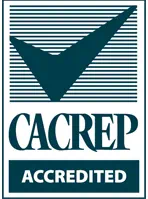
Counseling
New Mexico Highlands University’s counseling program offers four exciting concentrations in our master’s programs, tailored to suit your passion: clinical mental health counseling, clinical rehabilitation counseling, rehabilitation counseling, and school counseling.
 The Council for Accreditation of Counseling and Related Educational Programs, commonly known as CACREP, is an independent accrediting agency that assures graduate counseling programs throughout the United States and the world meet standards within the counseling profession.
The Council for Accreditation of Counseling and Related Educational Programs, commonly known as CACREP, is an independent accrediting agency that assures graduate counseling programs throughout the United States and the world meet standards within the counseling profession.
CACREP accreditation indicates that a program’s content and quality have been evaluated and meet strict, consistent standards set by the profession. Choosing a CACREP-accredited program also means the curriculum contains the academic knowledge necessary for professional licensure in many states.
Program at a Glance
 Ready to explore some options? The Department of Guidance and Counseling in the School of Education offers a master of arts program in counseling, which lets you specialize in one or more of four concentrations in addition to the core curriculum.
Ready to explore some options? The Department of Guidance and Counseling in the School of Education offers a master of arts program in counseling, which lets you specialize in one or more of four concentrations in addition to the core curriculum.
Concentrations are listed below:
Clinical mental health: 60 credit hours
Clinical rehabilitation counseling: 60 credit hours
Rehabilitation counseling: 48 credit hours
School counseling: 60 credit hours
Rehabilitation counseling with vocational evaluation specialization: 54 credit hours
Online and In-Person Classes
Work towards your goals in a combination of learning styles. You’ll take online real-time and online asynchronous sessions through Zoom, as well as in-person on-the-ground classes. This variety of possibilities offers more accessibility to potential, current and returning students and ensures a diversity among students that cannot be matched by on-ground classes alone. In fact, we have students attending from all over the state of New Mexico and beyond.
Clinical Practice
The practicum is designed to provide you with 100 hours of valuable in-field experience. Forty of these hours are in direct service with clients, giving you a hands-on education in real-life settings.
With the internship, you’ll have 600 hours of in-field experience within your chosen concentrations, and 240 hours of direct service with clients. Both the practicum and internships build counseling skills and allow practice within a theoretical framework, all while you are supervised by a working professional in the field.
These are great opportunities. Many of our students are hired at the facilities where they did their practicum and/or internships after graduation.
HU CARES
The counseling program cares about your health. If you are experiencing distress and would like counseling services, please contact HU CARES.
Annual Reports & Outcomes Assessment Reports
NMHU’s counseling program is evaluated annually through several assessments with the aim of improving and maintaining the program. These evaluations reflect students’ ability to utilize comprehensive counseling knowledge, skills and theory in their practice.
Counseling Program Annual Reports
Outcomes Assessment Reports
Vision, Mission, and Program Objectives
Vision
To be a premier counselor education program that prepares counselors as agents of social change who transform the lives of individuals and communities they serve.
Mission
The mission of the Highlands’ counselor education program is to train entry-level counselors who are prepared for positions in community service agencies as mental health counselors, in school systems as school counselors, and in rehabilitation settings as rehabilitation counselors. We are committed to continuous improvement of quality and excellence that fosters critical reflection, integrates theory and practice, and promotes advocacy through a culturally responsive and inclusive approach.
Program Objectives
The Highlands’ counselor education program is designed to prepare students to be effective, proactive professionals who can develop, organize, and implement outstanding and comprehensive counseling services and programs. The program prepares students who:
- Demonstrate the ethical practice of counseling aligned with a professional counseling orientation in accordance with the standards and credentials of the counseling profession;
- Understand multicultural and pluralistic characteristics within and among diverse groups nationally and internationally while developing strategies for identifying and eliminating barriers, prejudices, and processes of intentional and unintentional oppression and discrimination;
- Demonstrate knowledge of factors associated with human growth and development across the lifespan;
- Understand career development theories and strategies for personal growth and vocational opportunities in a global economy;
- Utilize theoretical foundations of individual counseling, and skills in essential interviewing, counseling, and case conceptualization to promote client understanding of and access to a variety of community-based resources;
- Utilize theoretical foundations of group counseling and group work to plan ethical and culturally relevant strategies for designing and facilitating groups;
- Utilize methods of effective assessment relevant to academic, educational, career, personal, and social development;
- Understand the importance of research in advancing the counseling profession, including how to critique research to inform counseling practice; and,
- Exhibit a capacity for self-reflection and an openness to feedback to evaluate and improve personal and organizational practices.
Graduate courses in Counseling
Graduate certificate in Counseling
Department Chair:
Geri Glover: gjglover@nmhu.edu
Office phone: 505-454-3396
Graduate students are assigned to a faculty adviser within their area of study. The faculty adviser will help the student complete a program of study to satisfy the specific course requirements within their area, outlined in the Graduate Catalog. The courses listed must satisfy the course requirements prescribed in the catalog of record. The academic adviser will provide guidance in completing your program of study.
Requirements:
- Statement of educational goals demonstrating what motivates you to become a counselor and what you hope to contribute to the counseling profession
- Two professional dispositions
- Resume
- Transcripts from all previously attended regionally accredited institutions (3.0 GPA or higher). Will consider those who do not meet the GPA requirement.
Deadlines:
Summer and fall semesters, April 15
Spring semester, November 15
Decision to follow one month after the application deadline
Admit for fall, spring, and summer terms
The NMHU Counseling Program has three Certificate options for applicants who have already earned a Master of Arts in Counseling and wish to pursue additional licensure or certification.
Professional Counseling Certificate (LMHC) Requirements are 18 credit hours in addition to exam. The credit hours are included in the Clinical Mental Health Counseling Master’s Program track. Rehabilitation Counseling Certificate (CRC, PED K-12) requires 18 credit hours in addition to experience as well as supervision. School Counseling Certificate Program (PED K-12) requires 12 credit hours and PED exam. The in-depth requirements for the certifications and additional information can be found here.
Faculty and Staff
Geri Glover, Ph.D.
PROFESSOR, DEPARTMENT CHAIR
Anna M. Koch, Ph.D.
ASSOCIATE PROFESSOR
Chia Vang, ABD
ASSISTANT PROFESSOR
Sulema Perales, Ph.D.
ASSISTANT PROFESSOR
Heather Smith, Ph.D.
ASSOCIATE PROFESSOR
Deanna Valdez, Ph.D.
ASSISTANT PROFESSOR
Melissa Vredenburg, MSW
SENIOR ADMINISTRATIVE ASSISTANT
